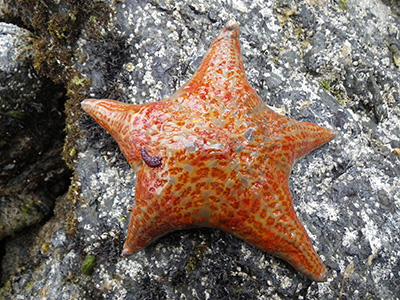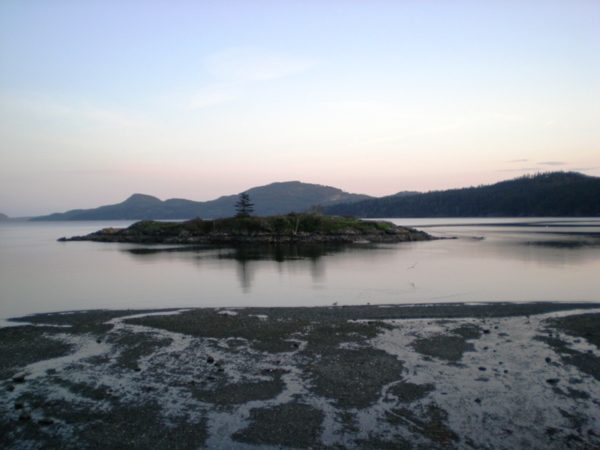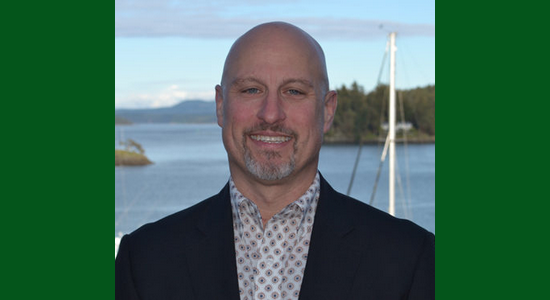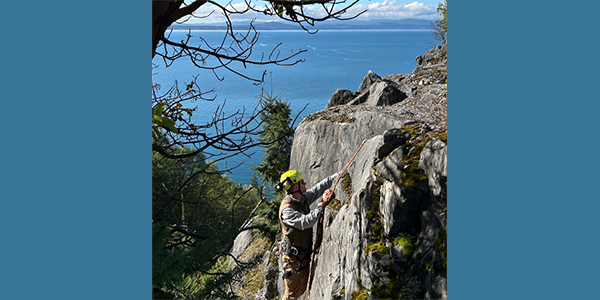The sheer number of feet on the beach and barnacle-encrusted boulders has become unsustainable
||| FROM RUSSEL BARSH for KWIAHT |||
Conservation research laboratory Kwiaht will host a virtual annual report on the changing Indian Island ecosystem on December 8 from 4:30 to 6:30 pm, with time for questions and discussion.

Imbricate star w/commensal worm
Kwiaht researchers and volunteer community scientists have been counting and measuring marine life at Indian Island since 2009. Data will be presented on trends in the abundance and species diversity of crabs, sea stars, and fishes that visit the island each summer to spawn; the health of eelgrass meadows; and nesting birds.
Kwiaht Director Russel Barsh suggests that Indian Island is a microcosm of wider climate change impacts throughout the Salish Sea. Animals and plants are adapting by changing their seasonal cycles, or moving away to cooler waters. Some species are demonstrating unexpected resilience, moreover, and appear to be thriving. Overall, however, Barsh says, diversity is down.
These climate-driven trends have been reinforced by trampling and disturbance of the intertidal zone by growing numbers of summer visitors—well over 4,000 this year. Kwiaht reports that while most visitors respond positively to local volunteers, avoid sensitive nesting areas, and leave marine life undisturbed beneath rocks and in tidepools, the sheer number of feet on the beach and barnacle-encrusted boulders has become unsustainable.
A conspicuous sign of this tipping-point has been a second year without Black Oystercatcher eggs or chicks, after a decade of nesting on the same rocky outcrop overlooking the islands cobbly southwest beach.
One step that Kwiaht supports is asking the Department of Natural Resources to designate state-owned tidelands in Fishing Bay an Aquatic Reserve. Under state law, this designation would give Orcas islanders an opportunity to devise a stewardship program and rules for public enjoyment of the bay ecosystem, work with county, federal and Tribal agencies, and recognize a “Citizen Stewardship Committee” to monitor and protect the living resources of the bay.
Details of the process for establishing and governing a state Aquatic Reserve will be the focus of an online discussion following the December 8 slideshow. For islanders that cannot join the live Zoom presentation and discussion, digital copies of the slideshow will be available upon request.
For a Zoom link, pre-order a free copy of the slideshow, or volunteer for the 2023 season, send an email to info@kwiaht.org with “Indian Island” in the subject line.
You can also support continuing local stewardship of the Indian island-Fishing Bay ecosystem by donating to Kwiaht in this year’s GiveOrcas Holiday campaign, December 1-15.
**If you are reading theOrcasonian for free, thank your fellow islanders. If you would like to support theOrcasonian CLICK HERE to set your modestly-priced, voluntary subscription. Otherwise, no worries; we’re happy to share with you.**









Thank you Russel for all that you do. While all of the county’s go-to environmental agencies continue getting A+, the anecdotal evidence (that which we see, hear, and feel) continues to be ignored while we continue to witness the destruction of our ecosystems. Overtourism degrades everything. Without limits the island’s, (including our communities), as we know them, will be destroyed.
Where’s the leadership? I’m still reeling from the responses that two of our county councilmen (1 recently gone, one on his way out) continually give at moments like this… “I don’t see a problem.”